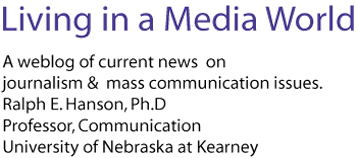Thursday - April 27, 2006
Questions Worth Asking (Maybe)
Wednesday, April 26, 2006
Tuesday, April 25, 2006
Questions Worth Asking (Maybe) Dept.
Friday, April 21, 2006
- Happy Birthday, Beverly Cleary!
One of my most precious literary souvenirs is an old-fashioned library card catalog card for the book The Mouse and the Motorcycle autographed by author Beverly Cleary. My wife bought it for me several years ago at a silent auction to raise money for our local public library.
I got to thinking about it today when I picked up a copy of the Arizona Republic from a week or two ago and read that Cleary just had her 90th birthday. She's best known for her Ramona and Henry Huggins books, which I enjoyed first as a young reader (especially the Henry Huggins books) and then as the father of a young reader (especially the Ramona books, many of which were written after I was beyond reading Beverly Cleary).
But while the article in the Arizona Republic was excellent, it made little mention of my favorite Beverly Cleary book - The Mouse and the Motorcycle. One day I was reading Mouse to one of my sons, and my wife came up to me and said, "That book is where it all came from! You and that mouse talk about motorcycles exactly the same way." And she's right, you know. The call of freedom, adventure and excitement that Ralph S. Mouse goes looking for on his shiny red motorcycle while wearing his ping pong ball helmet is exactly what I go looking for on my own bike. Beverly Cleary has written, I believe, the best book ever one what riding a motorcycle means.
As I've been researching the links for this entry, I'm almost overwhelmed by the affection that writers have for Cleary. Rather than seeing the same wire service articles over and over again, I saw dozens of newspaper with short, locally written stories about Cleary. It's obvious that she has a huge number of fans out there in the newspaper business. One thing, though, that I think people get wrong. Writers talk about what a great role model Ramona is for little girls. I'm sure she is. But she's a great character for boys and girls. I've read virtually the entire Cleary cannon to my youngest son, who pointed out without any prompting that he was just like Ramona, and his older brother was just like Beezus.
Happy 90th, Mrs. Cleary! Thanks for all the books, and thanks especially for Ralph S. Mouse.
Link Me
Wednesday, April 19, 2006
- Why The Washington Post Is America's Best Paper
You may have noticed that my entry yesterday was cheerleading for the WP and its four Pulizters.
If you read this blog on anything approaching a daily basis, you can't help but notice that I have more links to the Post than any other paper. (I do a lot of links to USA Today as well because the paper does a great job of covering media issues.) Blogger and NYU professor Jay Rosen did a great job back in October of explaining why he thinks the Washington Post has replaced the New York Times as America's "great national newspaper." He gives several reasons why:
The Post is more willing to experiment with their web site.
This matches my feelings exactly. I rarely blog to the Times unless there it has a truly exceptional story because most of the links to its web site turn into pay-for-play in a week (or less!). That doesn't make the web site useful. And to top it all off, the Times for a long time refused to pay freelancers for online sales of their work.
The Times no longer lives up to its old standards for reporting.
Rosen points to the problems with Judy Miller's coverage of the WMDs in the run-up to the Iraq war, Jayson Blair, Wen Ho Lee. (Thanks to Fishbowl DC for the link to Rosen's entry.)
To these arguments, I would add the following about why the Post is so good these days:
- The Post continually has stories that I just don't want to miss
- Howard Kurtz's tireless coverage of media issues
- The strong sense of holding the government accountable, regardless of the party in power;
- Hard-hitting stories that go beyond the usual suspects to tell me news that I really need to be reading.
- The Post has a real level of editorial independence. The only reason it seems like the Post is hammering on Republicans these days is that there aren't any Democrats with significant authority in Washington.
- The Post cares about what readers think, how they use the paper and the news that comes in it. Take a look at Gene Weingarten's affectionate critique of the paper as an example.
- The Post actually reports on the death of African-American women; not just wealthy white women.
- The Post understands the difference between science and religion and can report on both intelligently.
Link Me
Tuesday, April 18, 2006
Monday, April 17, 2006
Some Thoughts From Journalism Students Dept.
Wednesday, April 12, 2006
- The "True" iPod Video
Unknown to me, the current iPod video is not the "true" iPod video. Apparently Apple has a iPod with a 4-inch screen in the works slated to come out sometime this summer. (Actually, the story I'm linking to says late March, early April, but given that early April is in the past now, summer seems like a much better bet.)
The new larger screen device will supposedly be paired with some type of iTunes movie service. The hold up on this is that Hollywood wants a subscription service where you have to pay every month to keep access to the movies you've downloaded, while Apple's Steve Jobs wants to have customers own the movies they download, much as they own the music they buy from iTunes. This is particularly interesting because Jobs is both the chairman of Apple and a member of the Disney board of directors.
Link Me
- Readings on Rape and Privacy for my Ethics Students
Once again, it's time for some background reading for my ethics students. The following links primarily deal with the Kobe Bryant rape case from 2003, though some deal more generally with the issue of rape coverage. The issue I want to talk about here is not what the NBA player did or didn't do, but rather how the news media manage decide about running the names of those who are accused of rape v. naming those who are making the accusations. (Even the terms used to describe the accuser are loaded. Does calling a woman a rape victim/alledged victim/accuser imply that the accused is guilty or innocent?) So, here are several readings from the Poynter Institute on the subject:
- This is probably the most discussed piece written on the topic. In it, she argues that it is the obligation of the news media to run both the names of the accuser and the accused. The Poynter Institute refused to let her name the accuser in her column. Overholser resigned from Poynter over the issue.
Link Me
Tuesday, April 11, 2006
- UPDATED: Questions Worth Asking (Maybe) Dept.
Friday - April 7, 2006
- Questions Worth Asking Dept.
Thursday - April 6, 2006
- Diversity & The Media Dept. - What Are the Spanish-Language Media Saying About Immigration?
There's a lot of talk about what the mainstream media are saying about controversial issues like immigration. But the question I always want to ask is, "What is the alternative to the mainstream media?"
To me, the biggest alternatives are the Spanish-language media, especially radio and television. And many Americans aren't paying attention to what's being said on these stations for the simple reason that they don't speak Spanish.
NPR's On The Media recently took a look at how the Spanish-language radio stations are covering the debate over immigration policy, and the views that are being expressed there aren't just in opposition to what's on English-language media, they are completely different ideas. Among the topics covered were analysis from a scholar of Spanish language media, an interview with LA Times Mexico City reporter, and an interview with the author of the OC Weekly column "Ask a Mexican." (I actually started work on a "Ask a Mexican" item a couple months ago after reading an LA Times article on the topic, but I never got it developed. This is a great column on race issues that is wildly politically incorrect without being racist or offensive.) Remember, the On The Media items always have links to audio versions of the stories along with the transcripts.
Link Me
Tuesday - April 4, 2006
Ethics Exam #3 Links
The following links go with a take-home exam I'm giving in my media ethics class. You might find them interesting as well.
- History of the Karen Ryan Case
In March 2004, the US Department of Health and Human Services released several video news releases (VNRs) that looked a lot like news stories with "reporters" Karen Ryan and Alberto Garcia (in the English and Spanish versions respectively).
The following set of links give a history of the Karen Ryan VNR case from the Columbia Journalism Review Daily blog. Keep in mind that this is a blog that is taking a stand on the case. But the entries and links may prove to be useful in developing your analysis of the case.
- NPR Audio Story: PR Video News Releases Find News Airtime
For all the recent fuss over video news releases, the simple fact is that a lot of television stations are voluntarily choosing to run them. Listen to this story from All Things Considered about why they are getting used.
- The Karen Ryan Group
The PR agency that developed the controversial VNRs for the Department of Health and Human Services.
- RTNDA guidelines for using VNRs
RTNDA is the Radio-Television News Directors Association.
- Want to see a VNR?
This is a link to VNR-1 Communications, a company that produces VNRs. This page has links to current VNRs and audio productions from VNR-1. (Note: This is not the company that produced the Health and Human Services videos.)
Link Me
Monday - April 3, 2006
 Support our Reporters Dept. - Attacks on Journalists
Support our Reporters Dept. - Attacks on Journalists




 Support our Reporters Dept. - Attacks on Journalists
Support our Reporters Dept. - Attacks on Journalists